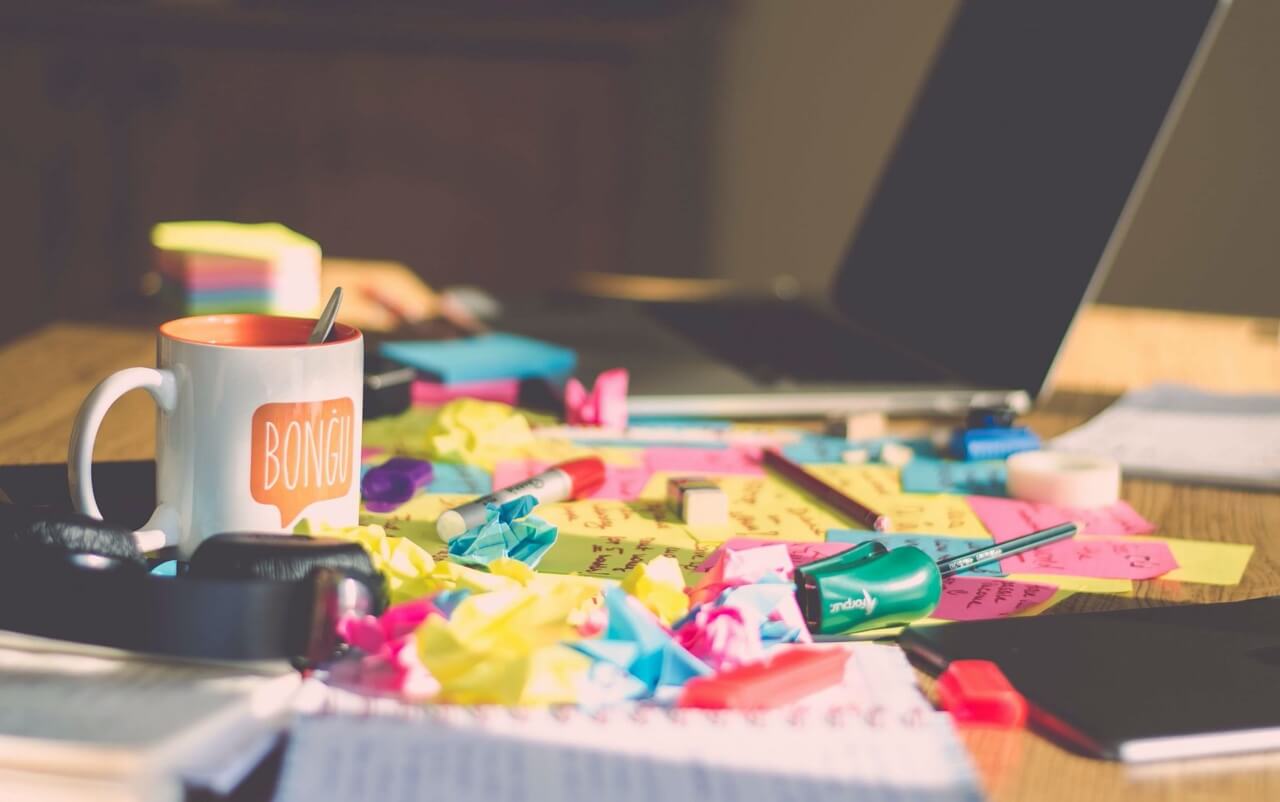Most of us have heard of Marie Kondo as the declutter queen or seen the organizational genius of @thehomeedit on Instagram, but the notion of decluttering has been around a long time.
Feng shui, a Chinese method of orienting buildings and objects in conjunction with nature, is now widely used to help people organize their homes and workspaces and, yes, declutter. When used correctly, feng shui helps you promote positive energy in your space.
So between a 6000-year-old practice and the wonders of Instagram, we know that clutter isn’t great for us. But why?
Why is Clutter Bad?
Visual clutter negatively affects our ability to concentrate. Clutter increases the processing power your brain has to do.
It’s like putting a single paper clip on a clean table. Your brain goes, ‘ah, a paperclip.’ Now imagine trying to find a single paperclip on a desk filled with papers, books, computers, and lightsabers. Your brain has a much harder time finding the thing you want because it has to sort through everything else.
Clutter also has been shown to increase stress. This study found that women who perceived their homes to be cluttered had higher levels of cortisol (stress hormone) than women who did not view their homes as cluttered spaces.
How Do I Declutter?
Clutter can be overwhelming and very quickly make us want to give up. There’s good news – you don’t have to transform yourself into a neat-freak overnight (or ever). Here are some tips to get you started:
1. Start small
“I’m going to declutter the whole house today!” Said no one ever. Pick one area – a counter, one shelf, or a drawer. Stick to just that area – no multitasking ! When you’re done, you’re done.
2. Set a timer
Some folks love to organize, while others would rather get a root canal. If you’re the latter, set yourself a five-minute timer. Spend five minutes in your designated area and sort through your items.
3. Make Three Piles
The ‘ does it spark joy? ’ rule is a great one but often very hard to follow. (No, my TI-83 calculator does not spark joy, but I’m still going to keep it.) I declutter with three piles – keep, trash, and maybe. My maybe pile is for stuff I’m not ready to trash, but not sure if I need. If I don’t use it/miss it after six months, it usually gets to the trash pile.
4. Designated areas
Often clutter comes from not knowing where to put something that you use often. Keys, mail, dog leashes, etc. If you designate a specific spot for those items, they won’t be strewn about your house. Keep a basket by the door for keys and mail, or have a small cabinet for dog items/shoes (I recommend fauxdenza DIY if you’re up for a project).
5. Stop Impulse Buys
This one is hard, especially while we’re at home 24/7 ( you’re welcome Mr. Bezos ). But buying more stuff often adds to clutter. If it’s not an essential (groceries, school supplies, etc.) put it on a list and wait 30 days. After 30 days, re-evaluate. Do you need another house caftan? Maybe, maybe not.
6. Maintain!
This is one of the hardest parts, BUT it will become part of your routine if you practice. If you’ve decided to keep one of your kitchen counters clear, make a plan to put stuff away as it appears or tidy up every night before bed.

What Does Feng Shui Have to do With Clutter?
As mentioned earlier, feng shui has been around for thousands of years. One of the most vital teachings of feng shui is no clutter. Clutter is your enemy.
Feng shui is based around the principles of Chi and Sha – good and negative energy flow. If you walk into a home or office and feel relaxed and comfortable, then you’re experiencing good feng shui. The Chi (good energy) is moving freely in the space, which cuts down on any Sha (negative energy).
Feng shui and common sense have a lot of overlap – odds are you’ve incorporated some feng shui practices into your home without even knowing it.
When it comes to clutter, feng shui principles teach us that clutter invites negative energy. Remember: decluttering isn’t just cleaning. It’s about removing old, broken, or unused items in your home. Do you really need three iPhone boxes? Are you holding on to broken electronics or random cords from TVs past? Why do you have four rolling pins?
Feng shui may sound a little too hippy dippy for some, and that’s okay. I personally use feng shui as a guide when I’m having trouble with an area in my house that doesn’t feel quite right. If you’re interested in learning more about Feng shui principles, here are some resources:
The Decluttering Bottom Line
Yes, clutter is bad. It makes it harder to focus and may up your stress levels. That said, a little decluttering can go a long way. Start small, pick one area at a time, and give yourself a break. If feng shui energy vibes feel too weird for you, no worries. Even if you declutter just your workspace or desktop, you’re making progress towards a more productive 2021. Happy New Year and happy decluttering.

 learning science
learning science